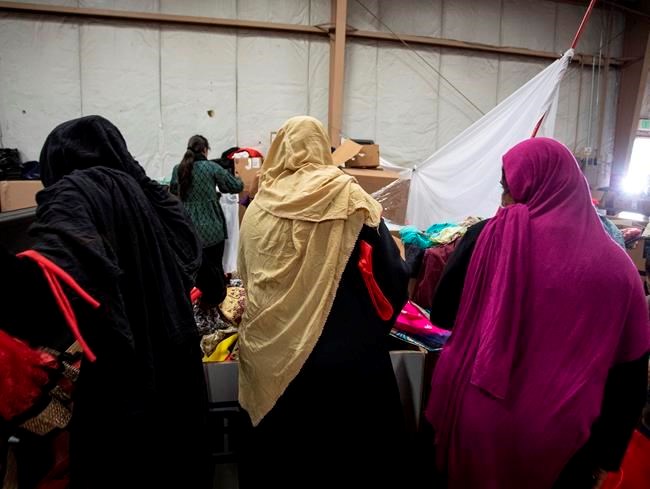TORONTO — A group of advocates is urging the federal government to remove the limit on applications to sponsor certain Afghan refugees in Canada – or at least stop counting rejected applications towards it.
The government introduced a new program last month to allow Canadian individuals and organizations to privately sponsor up to 3,000 Afghan refugees who don't have refugee status from the United Nations refugee agency or a foreign state.
It said it will accept sponsorship applications under the new program until Oct. 17, 2023, or once it has received applications for 3,000 refugees – whichever comes first.
In a letter sent to Immigration Minister Sean Fraser last week, a volunteer with Northern Lights Canada, a non-profit that’s been helping Afghan refugees in Toronto, said the new program’s cap is "highly prejudicial," compared to the accommodations made for Ukrainians who want to come to Canada.
"Minister Fraser, I urge you to reconsider the design of the Afghan special program," Heather Finley wrote in her letter dated Oct. 22.
"By raising the applicant quota and removing rejected applications from it, you will allow a more fair and equitable opportunity for Afghans in Canada to sponsor their families to join them here."
Stephen Watt, co-founder of Northern Lights Canada, said the new program doesn't come close to meeting the needs of Afghan refugees and their families and friends in Canada.
"Just having 3,000 spots in a crisis where millions of people are very recently displaced. It is insulting," he said in an interview.
Almost 109,000 Ukrainians arrived to Canada between Jan. 1 and Oct. 23 under special programs the government introduced to help unlimited numbers of Ukrainians and their family members flee the war in Ukraine to safety.
Meanwhile, Ottawa has committed to resettling a total of 40,000 Afghan refugees after the Taliban took over Afghanistan in August of last year, with fewer than 23,000 having arrived in Canada so far.
Immigration Department spokeswoman Isabelle Dubois said the program that has allowed Ukrainians to come to Canada is using the department's existing temporary resident visa processes, networks and infrastructure to bring as many of them as quickly as possible.
"This is not a refugee program, as compared to our Afghanistan refugee resettlement program, since Ukrainians have indicated that they need temporary safe harbour," she said.
"Many of them intend to return to their home country when it will be safe to do so."
Dubois said the government provided 3,000 additional spaces for organizations wanting to sponsor Afghan refugees in addition to the 3,000 spaces under the new special program.
"We are also processing existing and new private sponsorship applications for up to 7,000 Afghan refugees," she said.
Watt said the new program's application system crashed shortly after the government opened it at midnight on Oct. 17 due to many people rushing to submit applications.
He said many will likely end up rejected on a technicality because the government said it will process only the first 3,000 applicants and thus sponsors had to raise funds and write their sponsorship applications quickly.
"It's so disappointing," he said.
"This announcement that whether (the applications) are good or bad, we're still going to count them towards the total. So, what that did was create this condition where people were frantically rushing to put together applications."
Dubois confirmed the government will count all completed applications towards the new program's 3,000 limit and said the department is currently reviewing the received applications to determine whether it reached that cap.
"We understand some clients experienced issues when submitting an application. No applications were lost as files were automatically backed up," Dubois said.
"Applications are reviewed on a first-in, first-out basis to determine their completeness. We will continue to send out acknowledgments of receipt for applications that are determined to be complete and accepted into processing."
Watt said the government should remove the cap on how many Afghan refugees can be privately sponsored for one year to allow people to work on the sponsorship applications -- which he said can take months to put together because the requirements are so stringent and excessive.
"If you had a family of seven that may be $70,000 you have to get together. You have to get all the sponsorship documents lined up. You have to write the application," he said.
"Filling out PDFs perfectly in perfect English when you'reanew Canadian, and having to having to rise to the challenge of these applications which are very demanding even for people who are completely fluent in English and have great use of computer skills."
Andrew Griffith, a former director at the federal Immigration Department, said he is not aware of any government immigration or refugee program that counted rejected application towards the target other than the new special program for Afghan refugees.
He said many have been criticizing the government for apparently prioritizing Ukrainian refugees over Afghan refugees.
"The situations for both sets of refugees are dire in many cases," he said. "I'm not (trying to) apply any value statements on that, but it does highlight another discrepancy between the the two groups of refugees in my view."
Griffith said it's true that the Ukrainians are formally coming to Canada on temporary visas, but many of them may end up staying here.
"Realistically, how many of the people accepted from Ukraine will go back?" he said. "I think most of them would probably like to go. I don't deny that. But it depends on the situation."
This report by The Canadian Press was first published Oct. 28, 2022.
Maan Alhmidi, The Canadian Press



